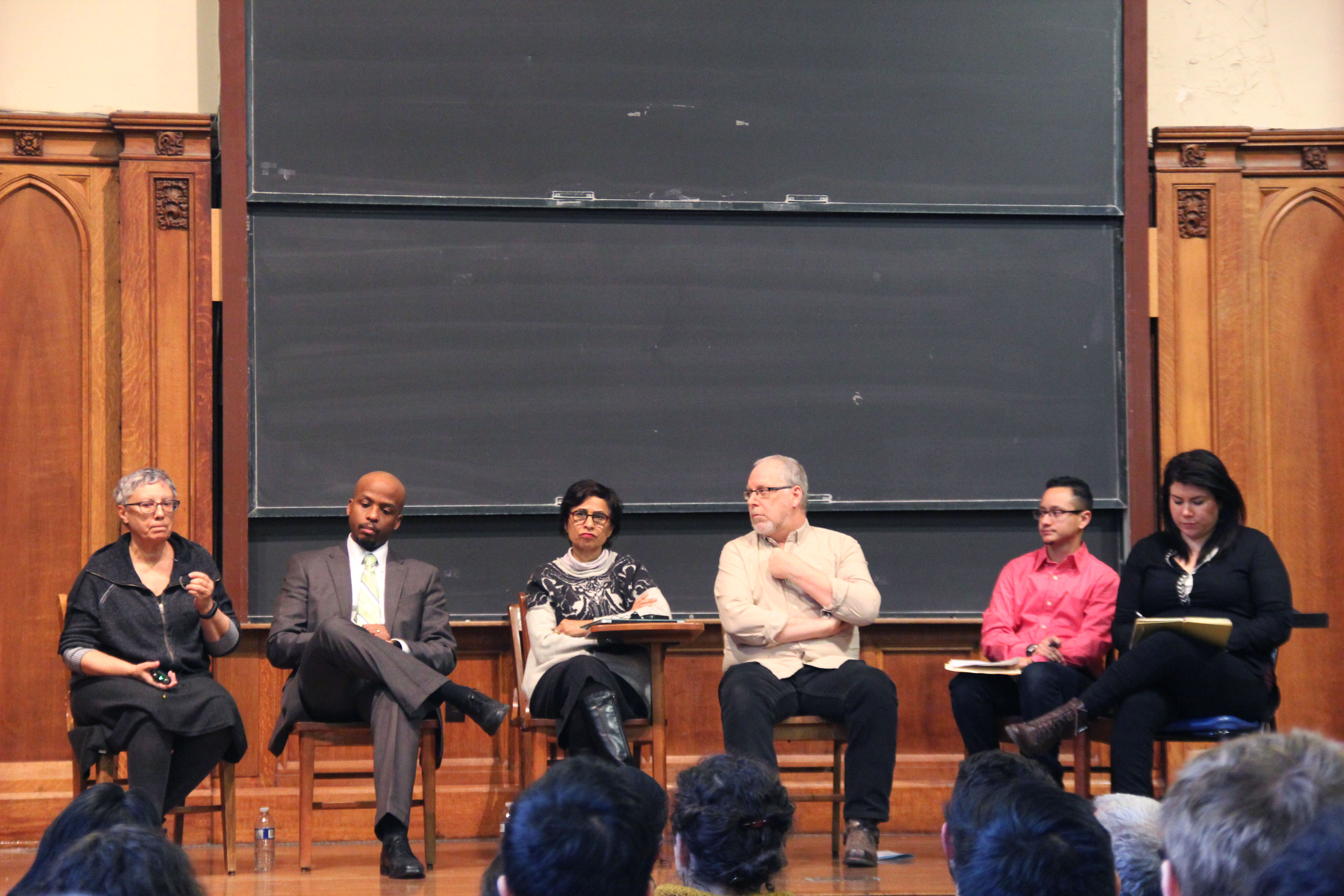
Even as many students continued to make their way back to campus after winter break, over 200 attendees packed Sudler Hall Monday, lining the walls and flowing into the hallway for “Keywords in Critical Ethnic Studies,” a teach-in jointly sponsored by the Program in Ethnicity, Race & Migration as well as the African American Studies Department and the American Studies and Women’s, Gender and Sexuality Studies Programs.
The teach-in was the first event this semester to continue weeks of forums, rallies and discussions about racial controversies that erupted on campus last fall. And although a similar event was held on Nov. 11 in Battell Chapel to address the theme “A Moment of Crisis: Race at Yale,” this teach-in was the first to be officially sponsored by Yale departments. It was held in response to a call by Next Yale — a coalition of students advocating for racial justice on campus — for the University to offer an ethnic studies education. Though University President Peter Salovey has promised to open a center devoted to race and ethnicity this year, he did not commit to the group’s demand for an ethnic studies requirement.
The four-hour event began with a brief introduction by Yale College Dean Jonathan Holloway, before members of the Yale community were invited to participate in one of 24 simultaneous seminar-sized discussions surrounding specific “keywords,” or words or phrases that are important to the experiences of people of color. Each session was led by a faculty member or graduate student. Topics included “Decolonizing Feminism,” “Coalitions Beyond Identity Politics” and “Cultural Appropriation.”
“The focus on the keywords is really a reminder about the power language and words can have,” event organizer Yami Rodriguez GRD ’20 said. “It’s to really understand that words and language have impact and consequences, and deserve conversations on why certain words are used.”
Event organizer Damian Bracamontes GRD ’19 said the discussions were meant to engage ongoing conversations about what an ethnic studies education would look like and what the departments’ roles would be in that education.
American Studies professor Michael Denning GRD ’84, another organizer for the event, said the teach-in’s seminar format allowed the event to continue with the message of the November teach-in in a more intimate manner. He added that the first event was a success, but this teach-in aimed to engage all attendees in the conversation instead of just having audience members listen to speakers.
“The reason we used keywords and shaped the event in this way was because some of us as graduate educators saw gaps in last semester’s events, where students utilized language that not everyone had a clear idea of what they meant,” said Jorge Cuellar GRD ’18, who also helped organize the event. “It became an interesting idea to deepen those terms and to get everyone on the same page.”
More than 40 graduate students and faculty members were involved in leading the event. Connor Williams GRD ’21, who led a seminar on white privilege, said the event provided a rare opportunity for participants to come together, speak in a free and open manner and transcend the assumptions people so often make about each other. It was also evidence that campus conversations about race and culture are happening on multiple levels, not just among undergraduates, he added.
Participants interviewed said they found the teach-in powerful and informative in continuing last semester’s discussions. Bernie Lauredan SOM ’17 said he found the seminar he participated in to be particularly valuable, as it focused on “redlining” — the practice of denying services to residents of certain areas based on race or ethnicity — which he said is still pertinent to urban communities today. He noted that these types of discussions are important to have around the year, not just on holidays like Martin Luther King Jr. Day, and should be brought into the heart of a Yale education.
“This teach-in gave me hope that Yale is trying to be relevant again to the community,” said Maria Threese, a former fellow at the Yale Child Study Center who led a seminar at the teach-in. “It’s refreshing to know that other people of color have felt the same way and [to] have affirmation that my individual struggle is a part of a collective struggle.”
To close the forum, participants gathered in Sheffield-Sterling-Strathcona Hall for a final panel between African American Studies and American Studies professor Hazel Carby, Women’s, Gender and Sexuality Studies professor Inderpal Grewal, American Studies professor Matthew Jacobson and African American Studies professor Anthony Reed. Speakers touched on the uphill battles and importance of each of the departments, drawing attention to the negative connotations often associated with programs such as ethnic studies. Panelists also emphasized the role students play in bringing these subjects into universities.
“No matter how much the faculty struggle, we will never be listened to without the support of the undergraduates,” Carby said during the panel. “We are here because of the pressure [the students] put on the institution.”
Correction, Jan. 19: A previous version of this article incorrectly identified the American Studies and Women’s, Gender and Sexuality Studies Programs as departments.







